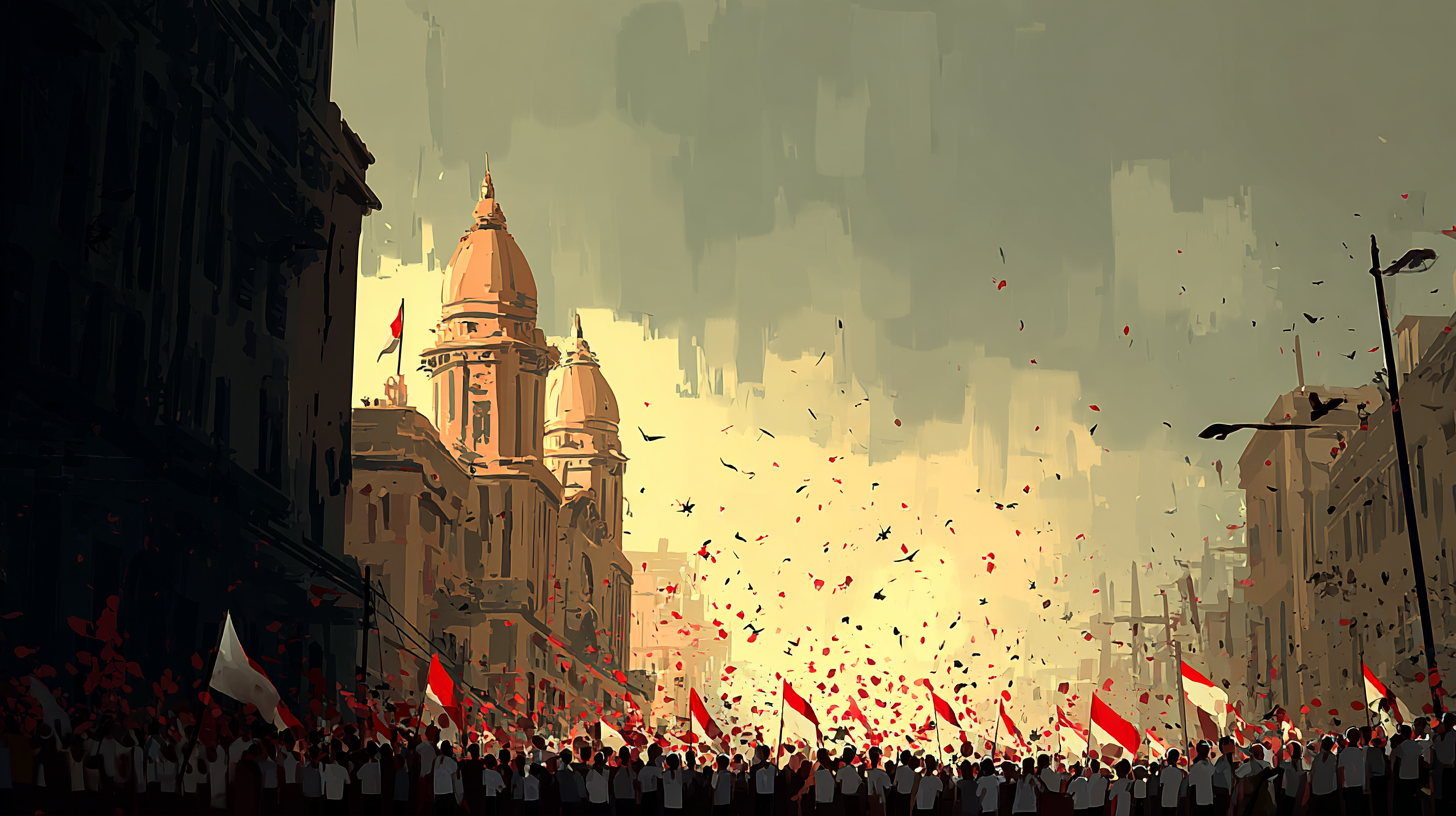A republic is a country ruled by people chosen by the citizens, not by a king or queen.
王様や女王ではなく、国民が選んだ人たちが国を治める国のこと。
以下は英単語 “republic” に関するストーリー型学習コンテンツです。まずは大枠の意味を理解して最後の文章で確認しましょう。
「republic」の主な意味(main meaning)
| 品詞 | 定義(英語) | 発音記号 | 例文 |
|---|---|---|---|
| noun | a country governed by elected representatives and a president, not by a king or queen | /rɪˈpʌblɪk/ | France is a republic with a president as its head of state. |
「republic」の語源(etymology)
ラテン語 res publica(公共のこと)に由来。
「人々のもの・公共の事柄」という核のイメージがあり、「王族の私物ではない国」を意味します。
「republic」の類義語(synonyms)
| 類義語 | 例文 |
|---|---|
| democracy | In a democracy, people vote to choose their leaders. |
| commonwealth | Australia is part of the Commonwealth of Nations. |
| state | Each state has its own government in the United States. |
| nation | Japan is a peaceful and advanced nation. |
| federation | The United States is a federation of individual states. |
「republic」の反義語(antonyms)
| 反義語 | 例文 |
|---|---|
| monarchy | The United Kingdom is a monarchy with a royal family. |
| dictatorship | In a dictatorship, one leader holds all the power. |
「republic」のコロケーション(collocations)
| コロケーション | 例文 |
|---|---|
| declare a republic | The country declared a republic after the revolution. |
| a democratic republic | South Korea is a democratic republic. |
| the Republic of Korea | The Republic of Korea is another name for South Korea. |
| form a republic | After gaining independence, they formed a republic. |
| the birth of a republic | The book describes the birth of a republic in Africa. |
「republic」の2項表現(binomials)
| 表現 | 例文 |
|---|---|
| law and order | A republic must maintain law and order. |
| rights and responsibilities | In a republic, citizens have both rights and responsibilities. |
英語ストーリー(english story)
Title: “The Birth of a Republic”
Tomoko, a high school student in Japan, was researching political systems for her social studies class. She became interested in how different countries are governed. Her teacher gave her an article about how a small island nation recently changed from a monarchy to a republic.
According to the article, the people were unhappy with their king. They felt he did not listen to their needs. After a peaceful protest and many discussions, the country declared a republic. Now, they elect their president every five years. The country became a democratic republic.
Tomoko learned that a republic is a country where citizens choose their leaders, unlike a monarchy where power stays in one family. She also read about similar systems like democracy and federations. For example, the United States is a federation, and South Korea is officially the Republic of Korea.
She found interesting collocations like “form a republic” and “declare a republic.” She also saw the phrase “law and order” often used when describing a good government.
Inspired by the story, Tomoko wrote an essay about the birth of a republic and how it shows the importance of rights and responsibilities in a democratic society. Her teacher praised her for using many useful terms like republic, democracy, and law and order in her writing.
和訳
タイトル:「共和国の誕生」
高校生の智子は、社会の授業で政治制度について調べていた。彼女は国ごとに統治の方法が違うことに興味を持った。先生は、最近ある小さな島国が王政から共和国へ変わったという記事を渡してくれた。
その記事によると、国民は王に不満を持っていた。王は国民の声を聞こうとしなかった。平和的な抗議や多くの議論の後、国は**共和国(republic)を宣言した。現在では5年ごとに大統領を選挙で選んでいる。その国は民主共和国(democratic republic)**となった。
智子は、**共和国(republic)**とは、**王政(monarchy)**のように一つの家系が力を持ち続けるのではなく、国民がリーダーを選ぶ国であることを学んだ。また、**民主主義(democracy)や連邦制(federation)などの類似の制度についても知った。たとえば、アメリカは連邦国家(federation)であり、韓国は正式名称を大韓民国(Republic of Korea)**という。
「共和国を作る(form a republic)」「共和国を宣言する(declare a republic)」のような表現も面白いと感じた。また、「法と秩序(law and order)」という表現が、良い政府を表す際によく使われているのも知った。
この話に感動した智子は、「共和国の誕生」と題した作文を書き、民主主義社会では国民の権利と責任(rights and responsibilities)が大切であることを述べた。先生は、作文にrepublic、democracy、law and orderといった重要な用語をうまく使っていたと褒めてくれた。
「republic」のQ&A
- Q類義語「democracy」と「republic」の違いは何ですか?
- A
「democracy(民主主義)」は人々が直接または間接的に意思決定に関わる政治制度のことです。「republic(共和国)」は王族がいない国の形を表し、多くの場合民主的な制度を持ちますが、「republic」は国の形、「democracy」は政治の仕組みに焦点を当てています。
- Q「commonwealth」は「republic」と同じ意味ですか?
- A
似ていますが少し違います。「commonwealth」は共通の利益で結ばれた国家という意味があり、「republic」と同じく国民が統治に関わる国ですが、歴史的・文化的背景により異なる意味で使われることがあります。
- Q「state」や「nation」も「republic」の言い換えに使えますか?
- A
部分的に使えます。「state(国家)」や「nation(国)」は一般的な「国」を指す言葉で、「republic」はその中でも特に政治形態を指す語なので、文脈によって言い換えが可能です。
- Q「monarchy(君主制)」は「republic」とどう違いますか?
- A
「monarchy」は王や女王など、世襲で権力を持つ君主が治める国を指します。一方「republic」は国民が選んだ代表が治める国です。政治の権力がどこから来るかが大きな違いです。
- Q「dictatorship(独裁制)」は「republic」の反対ですか?
- A
ある意味で反対です。「republic」は複数の人が参加する政治制度であるのに対し、「dictatorship」は1人の独裁者が権力を握る体制で、民主的要素がありません。
- Q「declare a republic」はどういう意味ですか?
- A
「declare a republic」は「共和国を宣言する」という意味で、国が公式に王政をやめて共和国になることを発表することです。
- Q「a democratic republic」とはどういう国ですか?
- A
「a democratic republic」は「民主的な共和国」という意味で、国民が選んだ代表によって運営される国のことです。多くの現代の共和国はこの形です。
- Q「form a republic」と「declare a republic」の違いは何ですか?
- A
「declare a republic」は公式に共和国となることを宣言する場面に使い、「form a republic」は新しく共和国の制度をつくり上げることを指します。前者は宣言、後者は構築の意味が強いです。
- Q「law and order(法と秩序)」はなぜ「republic」と一緒によく使われるのですか?
- A
「republic」では国民が政治に参加するため、社会を安定させるための「法と秩序(law and order)」が重要視されるからです。良い統治の象徴として使われます。
- Q「rights and responsibilities(権利と責任)」は共和国とどう関係しますか?
- A
「republic」では国民に選挙などの「権利(rights)」がある一方で、法律を守るなどの「責任(responsibilities)」もあります。この2つのバランスが大切です。
| 単語 | 意味(やさしい説明) | 主な使い方 | 例文(中高生向け) |
|---|---|---|---|
| republic | 王様・女王がいない国。国民が代表を選ぶ | 国家の政治体制(共和制)を指す | Japan is a constitutional monarchy, not a republic.(日本は共和国ではなく、立憲君主制です。) |
| democracy | 国民が自分たちの意見を反映できる制度 | 政治のしくみ・価値観(民主主義)を指す | In a democracy, people have the right to vote.(民主主義では人々に投票の権利がある。) |
| state | 「国」「州」「政府」の意味を持つ広い言葉 | 国・政府・国家という意味で使われる | The state provides free education.(国は無償教育を提供している。) |



コメント